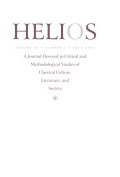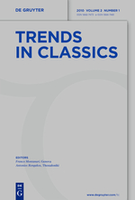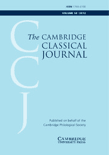
MNEMOSYNE
Scope & Guideline
Nurturing a legacy of excellence in humanities research.
Introduction
Aims and Scopes
- Philological Analysis of Classical Texts:
The journal frequently publishes papers that delve into the nuances of ancient texts, focusing on textual criticism, emendations, and interpretations of Greek and Latin literature. - Interdisciplinary Approaches to Classical Studies:
MNEMOSYNE encourages interdisciplinary research, integrating perspectives from history, philosophy, and linguistics to provide a comprehensive understanding of classical texts and their contexts. - Exploration of Ancient Culture and Society:
Research often addresses cultural, social, and political themes within classical literature, examining how these works reflect and shape the societies from which they originated. - Mythology and Literature:
The journal features studies on mythological narratives and their literary representations, exploring how these myths influence literature and cultural identity in the ancient world. - Modern Reception of Classical Texts:
MNEMOSYNE also investigates the impact of classical works on later literature and contemporary thought, analyzing how ancient texts continue to resonate in modern contexts.
Trending and Emerging
- Digital Humanities and Textual Analysis:
There is a growing emphasis on the application of digital tools and methodologies for textual analysis, reflecting a broader trend in humanities scholarship that embraces technology in the study of classical texts. - Narrative Techniques and Literary Structures:
Recent publications show an increased interest in the examination of narrative techniques and formal structures within classical literature, indicating a shift towards more literary-critical approaches. - Cultural Memory and Identity in Classical Texts:
Emerging research themes focus on how classical literature contributes to cultural memory and identity formation, exploring the interplay between ancient texts and contemporary cultural narratives. - Ecocriticism and Nature in Classical Literature:
There is a rising trend towards ecocritical readings of classical texts, analyzing representations of nature and environmental themes, which aligns classical studies with modern ecological concerns. - Gender Studies in Classical Contexts:
The journal is increasingly featuring research that examines gender dynamics and representations within classical literature, reflecting a broader movement in literary studies towards inclusivity and critical diversity.
Declining or Waning
- Historical Contextualization of Texts:
There has been a notable decrease in papers emphasizing the historical context of specific texts, suggesting a shift towards more abstract or theoretical analyses rather than grounded historical studies. - Comparative Literature Studies:
The journal has seen fewer comparative studies that juxtapose classical texts with works from other cultures or periods, indicating a potential narrowing of focus towards more insular analyses of ancient literature. - Philosophical Exegesis of Classical Thought:
Interest in deep philosophical interpretations of classical texts, particularly those focusing on ethics and metaphysics, appears to be waning, with fewer papers engaging in this type of analysis. - Reception Studies of Classical Literature:
The exploration of how classical texts have been received and interpreted throughout history is less frequently addressed, suggesting a potential decline in this area of scholarship. - Pedagogical Approaches to Classical Texts:
Research focusing on teaching methodologies and educational frameworks for classical literature has diminished, reflecting a possible shift away from pedagogical discussions within the journal.
Similar Journals

HELIOS
Bridging Disciplines Through Scholarly Discourse.HELIOS is a distinguished academic journal published by TEXAS TECH UNIVERSITY PRESS, focusing on the fields of Classics, Cultural Studies, Linguistics and Language, and Literature and Literary Theory. Since its inception in 1984, the journal has served as a platform for scholarly discourse, publishing innovative research that intersects various humanistic disciplines. With a Q3 ranking in Classics and Literature and Literary Theory, as well as a Q4 ranking in Cultural Studies and Linguistics and Language, HELIOS demonstrates its commitment to advancing academic inquiry and knowledge dissemination. Although it is not an open-access publication, HELIOS remains a vital resource for researchers, professionals, and students seeking to explore and contribute to the evolving landscape of the humanities. The journal is based in the United States, with its administrative office located at 2903 Fourth Street, Suite 201, Box 41037, Lubbock, TX 79409-1037, making it an integral part of the scholarly community.

Cahiers des Etudes Anciennes
Bridging Generations of Classical ScholarshipCahiers des Etudes Anciennes is a distinguished scholarly journal dedicated to the field of Classics, published by Université du Québec à Trois-Rivières. With its ISSN 0317-5065 and E-ISSN 1923-2713, this journal has been a vital platform for the dissemination of research since its inception in 1976, achieving Open Access status in 2006 to enhance accessibility and encourage wider readership. Operating from Canada, specifically Trois-Rivières, Quebec, this journal has cultivated an academic environment that fosters critical dialogue among classics scholars. With a Scopus ranking of 94 out of 170 in the Arts and Humanities - Classics category, placing it in the 45th percentile, it currently holds a Q3 quartile ranking, highlighting its growing influence in the academic community. Cahiers des Etudes Anciennes aims to publish high-quality research articles, reviews, and essays that contribute to the understanding of ancient civilizations, texts, and cultures, making it an invaluable resource for researchers, professionals, and students alike looking to explore the depths of classical studies.

Acta Classica
Advancing Scholarship in Classical Languages and LiteratureActa Classica is a distinguished journal dedicated to the field of Classics, published by the Department of English in Classical Languages at the University of Free State, South Africa. With its ISSN 0065-1141 and E-ISSN 2227-538X, this journal has been a pivotal platform for scholarly discourse since its inception in 1973, notably converging and evolving significantly in its content from 2010 to 2023. Although it currently holds a Q4 classification in Classics, its Scopus ranking at #88 out of 170 in the Arts and Humanities reflects its relevance in academic circles, with a 47th percentile standing. The journal aims to publish high-quality research articles, reviews, and critical essays that not only explore the rich tapestry of ancient civilizations but also contribute to contemporary understandings of classical languages and literature. While its content is not openly accessible, Acta Classica remains an essential resource for researchers, professionals, and students who seek to deepen their knowledge and engagement with Classical studies.

Materiali e Discussioni per l Analisi dei Testi Classici
Exploring the Depths of Classical LiteratureMateriali e Discussioni per l'Analisi dei Testi Classici is a distinguished academic journal published by Fabrizio Serra Editore that focuses on the rich field of Classics and Literature, serving as a vital platform for scholarly discourse and research. Featuring ISSN 0392-6338 and E-ISSN 1724-1693, this journal has been actively publishing since 2009, with a dedicated effort to analyze classical texts and foster critical discussions among academics and students alike. Although the journal operates without an open access model, it is recognized for its significant contributions, evidenced by its ranking in the third quartile (Q3) in both the Classics and Literature categories as of 2023. This places it among the notable outlets for literary and classical scholarship, with Scopus ranks highlighting its ongoing influence in these fields. Based in the heart of Italy, in Pisa, the journal not only enriches the academic community but also provides an essential resource for those engaged in the profound study of classical literature, inviting contributions that challenge and expand current knowledge and methodologies.

Auster
Advancing interdisciplinary insights in Humanities and Education.Auster is a prominent open-access journal dedicated to advancing interdisciplinary research within the fields of Humanities and Educational Sciences. Published by the esteemed Universidad Nacional de La Plata, specifically by the Faculty of Humanities and Educational Sciences, this journal has been a cornerstone for scholarly discourse since its establishment in 1996. With an ISSN of 1514-0121 and an E-ISSN of 2346-8890, Auster ensures wide accessibility to innovative research and critical analyses. Its commitment to open access fosters an inclusive academic environment, allowing researchers, students, and professionals in Argentina and beyond to engage with high-quality content that stimulates new ideas and interdisciplinary collaboration. The journal strives to publish timely, relevant articles that explore contemporary challenges in humanities and education, thereby positioning itself as an essential resource for anyone invested in these dynamic fields.

Trends in Classics
Unveiling the past through innovative classical research.Trends in Classics is a distinguished academic journal published by WALTER DE GRUYTER GMBH, dedicated to advancing the field of Classics through critical scholarship and innovative research. With an ISSN of 1866-7473 and an E-ISSN of 1866-7481, this journal offers a platform for scholars from around the globe to share insights on classical literature, history, and archaeology. Indexed in Scopus and awarded a respectable Q4 classification in Classics, it ranks 48th out of 170 in the Arts and Humanities category, placing it in the top 72nd percentile—an indicator of its growing influence and contribution to the field. Operating from Germany, specifically from Genthin Strasse 13, D-10785 Berlin, the journal spans converged years from 2009 to 2024, fostering ongoing dialogues and developments within classical studies. Although it does not currently offer open access, its commitment to scholarly excellence makes it a vital resource for researchers, professionals, and students alike, who seek to deepen their understanding of ancient cultures and their lasting impacts on contemporary society.

Rivista di Filologia e di Istruzione Classica
Advancing Scholarship in Classics and LinguisticsRivista di Filologia e di Istruzione Classica is a distinguished academic journal published by LOESCHER EDITORE, dedicated to advancing the fields of Classics and Linguistics. Based in Italy, this journal serves as a vital platform for original research, critical analysis, and scholarly discussions that enrich our understanding of classical texts and educational methodologies in the humanities. With its unique focus on the intricate relationship between classical literature and language, the journal aims to facilitate discourse among researchers, educators, and students alike. Although categorized in the fourth quartile in both Classics and Linguistics, it provides an essential venue for scholars seeking to disseminate their findings and engage with contemporary academic debates. The journal is indexed in various databases, though recent coverage in Scopus has been discontinued. Researchers interested in exploring the complex layers of classical philology and instructional practices are encouraged to contribute to and engage with the innovative scholarship presented in this journal.

Cambridge Classical Journal
Advancing the Legacy of Classical ScholarshipThe Cambridge Classical Journal, published by Cambridge University Press, is a prestigious academic journal that has been a cornerstone of classical scholarship since its inception in 1884. With a focus on advancing knowledge in the fields of Classics, Linguistics, and Literature and Literary Theory, the journal operates with an annual publication cycle, showcasing cutting-edge research that contributes significantly to these disciplines. With a commendable impact factor and ranking in the top quartile (Q1) for Classics and Q2 for Literature and Literary Theory as of 2023, it remains an essential resource for scholars, students, and professionals alike. The journal's commitment to excellence is evident in its rigorous peer-review process and its role in fostering scholarly dialogue on classical texts and their linguistic and cultural implications. While the Cambridge Classical Journal is not an open-access publication, it is invaluable for anyone seeking to deepen their understanding of the classical world and its enduring influence on contemporary thought.

International Journal of the Classical Tradition
Exploring the Echoes of Antiquity in Modern ThoughtInternational Journal of the Classical Tradition, published by SPRINGER in the Netherlands, is a prestigious scholarly journal that serves as a vital platform for the study and exploration of classical literature, philosophy, art, and other cultural studies that trace their origins back to antiquity. With its ISSN 1073-0508 and E-ISSN 1874-6292, this journal has solidified its reputation within the academic community, evidenced by its ranking in various categories—Q3 in Arts and Humanities (miscellaneous), Q2 in Classics, and Q3 in Cultural Studies as of 2023. The journal spans a wide temporal range of scholarly discourse, with articles published from 1994 to 2024, and offers critical insights appreciated by researchers and students alike. Although it is not an open-access journal, the wealth of knowledge it contains is invaluable for those keen on understanding the influence of classical traditions on contemporary thought. With impressive Scopus rankings, including a percentile of 73rd in Classics, this journal not only contributes to academic scholarship but also invites interdisciplinary conversations that bridge the past with modern-day applications, making it essential reading for anyone invested in the humanities.

Antichthon
Engaging Minds with the Legacy of AntiquityAntichthon, published by Cambridge University Press, stands as a vital platform within the field of Classics. Established in 1986, the journal has evolved to encompass scholarly contributions that explore various dimensions of classical studies, including literature, history, and cultural studies. With its rich publication history extending from 2011 to 2023, Antichthon boasts a commendable Q2 ranking in the latest 2023 Category Quartiles for Classics, reflecting its significant impact in the academic community. Although the journal does not offer an Open Access option, it continues to engage researchers and academics with its curated selection of articles, reviews, and critical insights. Located at the Edinburgh Building, Shaftesbury Rd, Cambridge, England, this journal remains an essential resource for both established scholars and students aiming to deepen their understanding of classical antiquity and its enduring relevance.